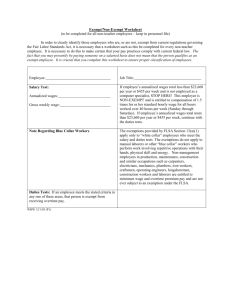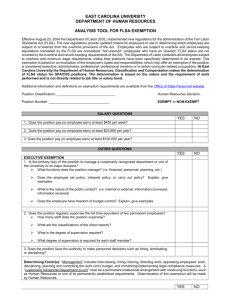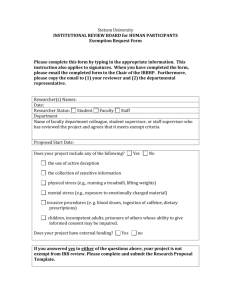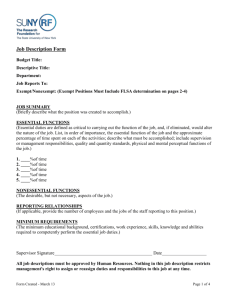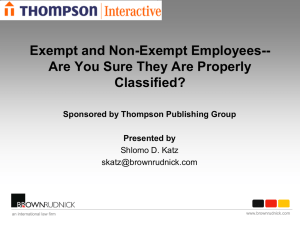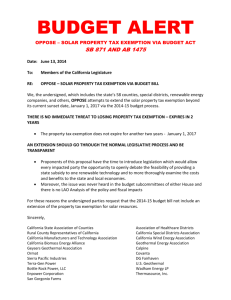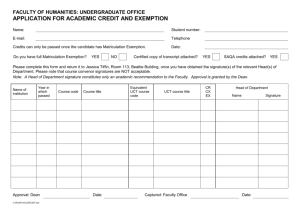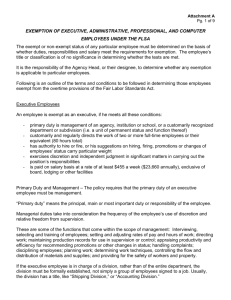FLSA Professional Exemption Checklist
advertisement
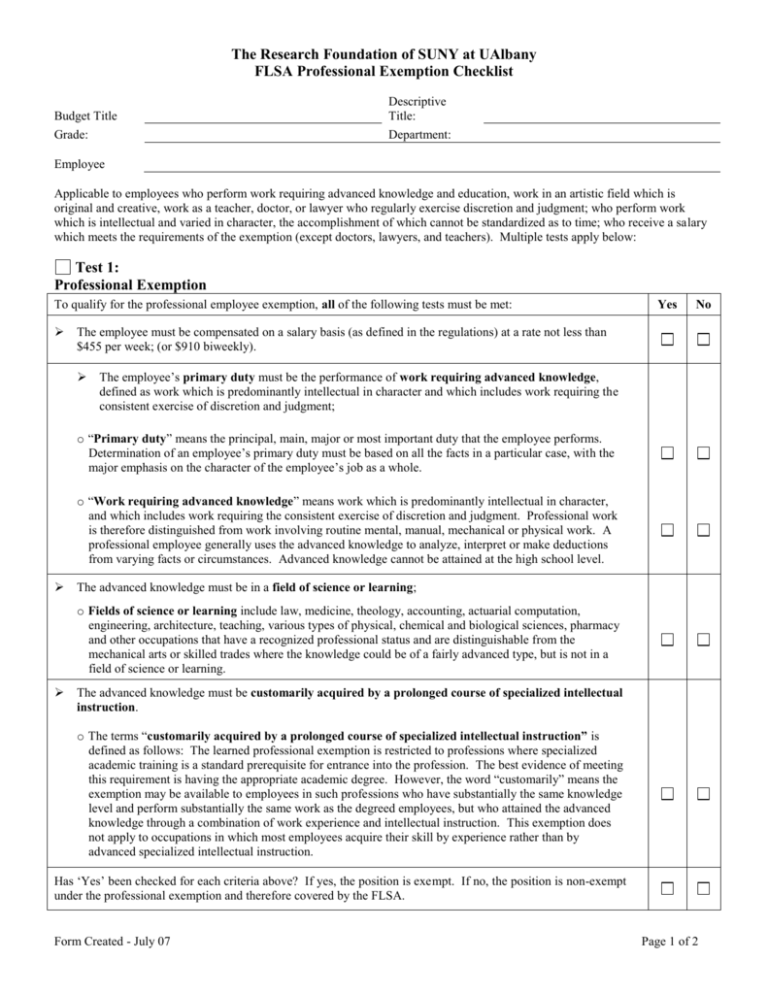
The Research Foundation of SUNY at UAlbany FLSA Professional Exemption Checklist Budget Title Grade: Descriptive Title: Department: Employee Applicable to employees who perform work requiring advanced knowledge and education, work in an artistic field which is original and creative, work as a teacher, doctor, or lawyer who regularly exercise discretion and judgment; who perform work which is intellectual and varied in character, the accomplishment of which cannot be standardized as to time; who receive a salary which meets the requirements of the exemption (except doctors, lawyers, and teachers). Multiple tests apply below: Test 1: Professional Exemption To qualify for the professional employee exemption, all of the following tests must be met: Yes No The employee must be compensated on a salary basis (as defined in the regulations) at a rate not less than $455 per week; (or $910 biweekly). The employee’s primary duty must be the performance of work requiring advanced knowledge, defined as work which is predominantly intellectual in character and which includes work requiring the consistent exercise of discretion and judgment; o “Primary duty” means the principal, main, major or most important duty that the employee performs. Determination of an employee’s primary duty must be based on all the facts in a particular case, with the major emphasis on the character of the employee’s job as a whole. o “Work requiring advanced knowledge” means work which is predominantly intellectual in character, and which includes work requiring the consistent exercise of discretion and judgment. Professional work is therefore distinguished from work involving routine mental, manual, mechanical or physical work. A professional employee generally uses the advanced knowledge to analyze, interpret or make deductions from varying facts or circumstances. Advanced knowledge cannot be attained at the high school level. The advanced knowledge must be in a field of science or learning; o Fields of science or learning include law, medicine, theology, accounting, actuarial computation, engineering, architecture, teaching, various types of physical, chemical and biological sciences, pharmacy and other occupations that have a recognized professional status and are distinguishable from the mechanical arts or skilled trades where the knowledge could be of a fairly advanced type, but is not in a field of science or learning. The advanced knowledge must be customarily acquired by a prolonged course of specialized intellectual instruction. o The terms “customarily acquired by a prolonged course of specialized intellectual instruction” is defined as follows: The learned professional exemption is restricted to professions where specialized academic training is a standard prerequisite for entrance into the profession. The best evidence of meeting this requirement is having the appropriate academic degree. However, the word “customarily” means the exemption may be available to employees in such professions who have substantially the same knowledge level and perform substantially the same work as the degreed employees, but who attained the advanced knowledge through a combination of work experience and intellectual instruction. This exemption does not apply to occupations in which most employees acquire their skill by experience rather than by advanced specialized intellectual instruction. Has ‘Yes’ been checked for each criteria above? If yes, the position is exempt. If no, the position is non-exempt under the professional exemption and therefore covered by the FLSA. Form Created - July 07 Page 1 of 2 Test 2: Creative Professional Exemption To qualify for the creative professional employee exemption, all of the following tests must be met: The employee must be compensated on a salary basis (as defined in the regulations) at a rate not less than $455 per week; (or $910 biweekly) The employee’s primary duty must be the performance of work requiring invention, imagination, originality or talent in a recognized field of artistic or creative endeavor. Yes No Yes No Yes No o “Primary duty” means the principal, main, major or most important duty that the employee performs. Determination of an employee’s primary duty must be based on all the facts in a particular case, with the major emphasis on the character of the employee’s job as a whole. o This requirement distinguishes the creative professions from work that primarily depends on intelligence, diligence and accuracy. Exemption as a creative professional depends on the extent of the invention, imagination, originality or talent exercised by the employee. Whether the exemption applies, therefore, must be determined on a case-by-case basis. The requirements are generally met by actors, musicians, composers, soloists, certain painters, writers, cartoonists, essayists, novelists, and others as set forth in the regulations. Journalists may satisfy the duties requirements for the creative professional exemption if their primary duty is work requiring invention, imagination, originality or talent. Journalists are not exempt creative professionals if they only collect, organize and record information that is routine or already public, or if they do not contribute a unique interpretation or analysis to a news product. o Recognized Field of Artistic or Creative Endeavor includes such fields as, for example, music, writing, acting and the graphic arts. Has ‘Yes’ been checked for each criteria above? If yes, the position is exempt. If no, the position is non-exempt under the creative professional exemption and therefore covered by the FLSA. Test 3: Teacher Professional Exemption To qualify for the teacher professional employee exemption, the following test must be met: Teachers are exempt if their primary duty is teaching, tutoring, instructing or lecturing in the activity of imparting knowledge, and if they are employed and engaged in this activity as a teacher in an educational establishment. Exempt teachers include, but are not limited to, regular academic teachers; kindergarten or nursery school teachers; teachers of gifted or disabled children; teachers of skilled and semi-skilled trades and occupations; teachers engaged in automobile driving instruction; aircraft flight instructors; home economics teachers; and vocal or instrument music teachers. The salary and salary basis requirements do not apply to bona fide teachers. Test 4: Law & Medicine Professional Exemption To qualify for the law and medicine professional employee exemption, the following test must be met: An employee holding a valid license or certificate permitting the practice of law or medicine is exempt if the employee is actually engaged in such a practice. An employee who holds the requisite academic degree for the general practice of medicine is also exempt if he or she is engaged in an internship or resident program for the profession. The salary and salary basis requirements do not apply to bona fide practitioners of law or medicine. Based on these guidelines, this position is declared: Exempt Non-exempt My signature certifies that the above checklist is correct Date _____________________________________________ Printed name _____________________________ Title Form Created - July 07 Page 2 of 2
